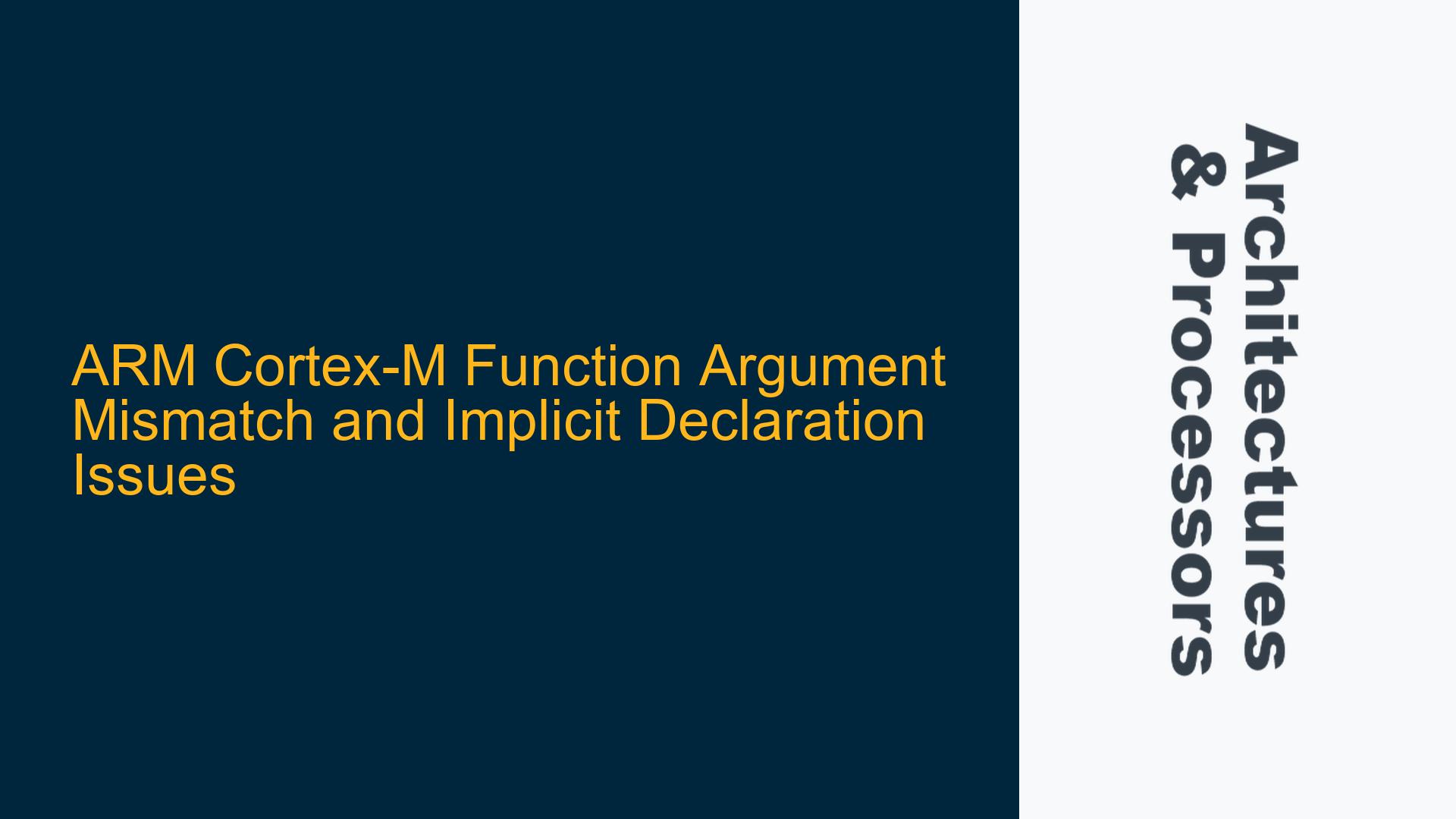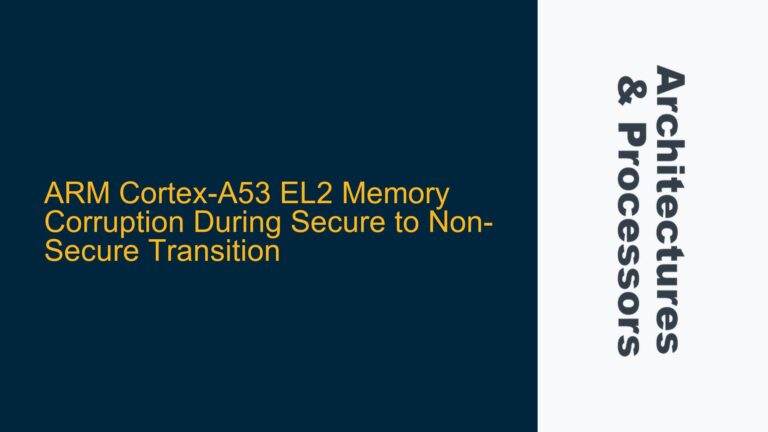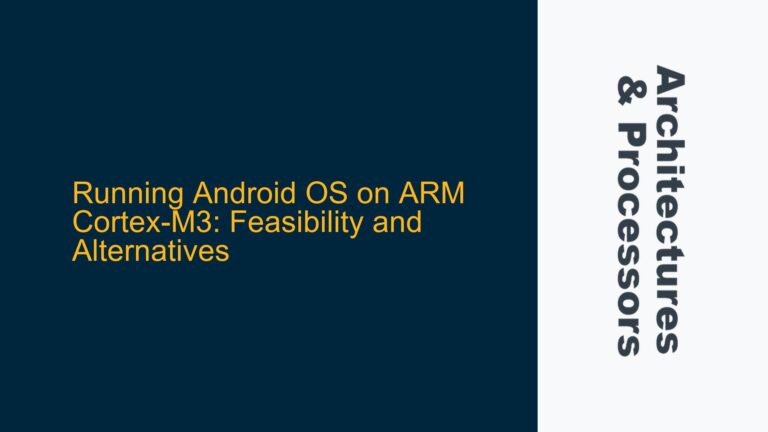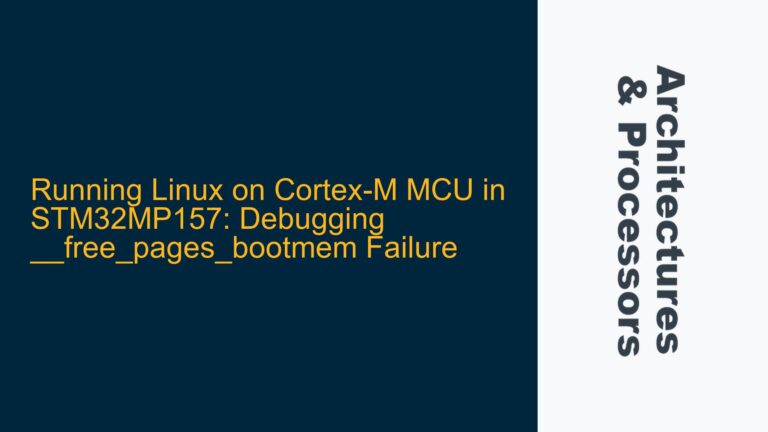ARM Cortex-M GPIO Initialization Function Argument Mismatch
The core issue revolves around a function GPIO_InitPIN that has been refactored to accept a structure GPIO_PINdef instead of two separate arguments: a GPIO_TypeDef pointer and a uint16_t pin identifier. The original function signature was void GPIO_InitPIN(GPIO_TypeDef *GPIOx, uint16_t GPIO_Pin_x), which was later changed to void GPIO_InitPIN(GPIO_PINdef GPIOx). The GPIO_PINdef structure is defined as follows:
typedef struct {
GPIO_TypeDef *GPIOx;
uint16_t PINx;
} GPIO_PINdef;
Initially, the refactored function worked without issues when called in both the old and new ways. However, problems arose when attempting to resolve a compiler warning: "function ‘GPIO_InitPIN’ declared implicitly." The warning was addressed by adding the function declaration void GPIO_InitPIN(GPIO_PINdef x); to the header file. This change caused the compiler to throw an error when the function was called with two arguments, as in GPIO_InitPIN(GPIOB, GPIO_Pin_8), stating that there were too many arguments.
The root of the problem lies in the mismatch between the function’s declared signature and its usage. The function is now designed to accept a single argument of type GPIO_PINdef, but it is being called with two arguments, which is incompatible with the new signature. This discrepancy highlights a critical issue in how function signatures are managed during refactoring, especially in embedded systems where function calls are often tightly coupled with hardware-specific operations.
Implicit Function Declaration and Argument Passing Mechanisms
The implicit declaration warning indicates that the compiler was not aware of the function’s prototype before it was used. In C, when a function is called without a prior declaration, the compiler assumes an implicit declaration with a return type of int and accepts any number of arguments. This behavior can lead to subtle bugs, especially when the function’s actual signature does not match the implicit declaration.
In the case of GPIO_InitPIN, the original function accepted two arguments, and the compiler implicitly assumed this signature when the function was called. However, after refactoring, the function was changed to accept a single argument of type GPIO_PINdef. When the function declaration was added to the header file, the compiler enforced the new signature, leading to errors when the function was called with two arguments.
The argument passing mechanism in ARM Cortex-M processors also plays a role in this issue. ARM architectures typically use registers for passing function arguments, especially in optimized builds. The original function GPIO_InitPIN(GPIO_TypeDef *GPIOx, uint16_t GPIO_Pin_x) would pass the GPIOx pointer and GPIO_Pin_x value in registers. However, when the function is refactored to accept a structure, the structure is typically passed by value, which means the entire structure is copied into the function’s stack frame. This change in argument passing mechanism can lead to inconsistencies if the function is called incorrectly.
Resolving Function Signature Mismatch and Ensuring Consistent Usage
To resolve the issue, the function signature must be standardized to ensure consistent usage across the codebase. There are several approaches to achieve this:
1. Standardize on the Structure-Based Function Signature
The most straightforward solution is to standardize on the structure-based function signature and update all function calls to use the GPIO_PINdef structure. This approach ensures that the function is always called with a single argument, eliminating the possibility of argument mismatch errors.
// Header file declaration
void GPIO_InitPIN(GPIO_PINdef x);
// Function definition
void GPIO_InitPIN(GPIO_PINdef x) {
// Function implementation
}
// Function call
GPIO_PINdef pinDef = {GPIOB, GPIO_Pin_8};
GPIO_InitPIN(pinDef);
2. Use Function Overloading (C++ Only)
If the project is written in C++, function overloading can be used to support both the old and new function signatures. This approach allows the function to be called with either two arguments or a single structure argument, providing backward compatibility while maintaining the new structure-based design.
// Header file declarations
void GPIO_InitPIN(GPIO_TypeDef *GPIOx, uint16_t GPIO_Pin_x);
void GPIO_InitPIN(GPIO_PINdef x);
// Function definitions
void GPIO_InitPIN(GPIO_TypeDef *GPIOx, uint16_t GPIO_Pin_x) {
GPIO_PINdef pinDef = {GPIOx, GPIO_Pin_x};
GPIO_InitPIN(pinDef);
}
void GPIO_InitPIN(GPIO_PINdef x) {
// Function implementation
}
// Function calls
GPIO_InitPIN(GPIOB, GPIO_Pin_8); // Calls the two-argument version
GPIO_PINdef pinDef = {GPIOB, GPIO_Pin_8};
GPIO_InitPIN(pinDef); // Calls the structure-based version
3. Use a Union for Function Pointers (Advanced)
For advanced users, a union can be used to define function pointers that support both the old and new function signatures. This approach allows the function to be called with either two arguments or a single structure argument, but it requires careful management of function pointers and is generally not recommended for most use cases.
// Union definition
typedef union {
void (*InitStruc)(GPIO_PINdef);
void (*InitParams)(GPIO_TypeDef*, uint16_t);
} funcTypes;
// Function definition
void realFunction(GPIO_PINdef x) {
// Function implementation
}
// Macros for function calls
#define paramCall(a, b) ((funcTypes*)realFunction)->InitParams(a, b)
#define strucCall(a) ((funcTypes*)realFunction)->InitStruc(a)
// Function calls
paramCall(GPIOB, GPIO_Pin_8); // Calls the two-argument version
GPIO_PINdef pinDef = {GPIOB, GPIO_Pin_8};
strucCall(pinDef); // Calls the structure-based version
4. Update All Function Calls to Use the New Signature
If backward compatibility is not a concern, the best approach is to update all function calls to use the new structure-based signature. This ensures that the function is always called with a single argument, eliminating the possibility of argument mismatch errors.
// Header file declaration
void GPIO_InitPIN(GPIO_PINdef x);
// Function definition
void GPIO_InitPIN(GPIO_PINdef x) {
// Function implementation
}
// Function call
GPIO_PINdef pinDef = {GPIOB, GPIO_Pin_8};
GPIO_InitPIN(pinDef);
5. Use a Wrapper Function for Backward Compatibility
If backward compatibility is required, a wrapper function can be used to support the old function signature while internally calling the new structure-based function. This approach allows existing code to continue using the old function signature without modification.
// Header file declarations
void GPIO_InitPIN(GPIO_PINdef x);
void GPIO_InitPIN_Old(GPIO_TypeDef *GPIOx, uint16_t GPIO_Pin_x);
// Function definitions
void GPIO_InitPIN(GPIO_PINdef x) {
// Function implementation
}
void GPIO_InitPIN_Old(GPIO_TypeDef *GPIOx, uint16_t GPIO_Pin_x) {
GPIO_PINdef pinDef = {GPIOx, GPIO_Pin_x};
GPIO_InitPIN(pinDef);
}
// Function calls
GPIO_InitPIN_Old(GPIOB, GPIO_Pin_8); // Calls the old function signature
GPIO_PINdef pinDef = {GPIOB, GPIO_Pin_8};
GPIO_InitPIN(pinDef); // Calls the new structure-based function
Conclusion
The issue of function argument mismatch and implicit declaration in ARM Cortex-M processors can be resolved by standardizing the function signature and ensuring consistent usage across the codebase. Whether through structure-based function signatures, function overloading, or wrapper functions, the key is to maintain a clear and consistent interface for function calls. By addressing these issues, developers can avoid subtle bugs and ensure reliable operation of their embedded systems.






